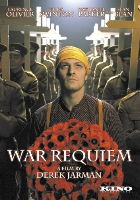
Understandably Controversial
Derek Jarman's
'War Requiem' -
reviewed by
HOWARD SMITH'... cutting room virtuosity.'
|

|
The War Requiem was commissioned for the reconsecration of Coventry Cathedral on 30 May 1962 after the original fourteenth century structure was destroyed in a World War II bombing raid on the night of 14 November 1940.
Now (finally on DVD), we can see events (enacted and archival) that inspired Britten and (simultaneously) hear his musical response in an original recording.
For this epic re-examination of men and women at war, voices we hear are those of Russian soprano, Galina Vishnevskaya; English tenor, Peter Pears; German baritone, Dietrich Fischer-Dieskau, The Bach Choir and London Symphony Chorus, Highgate School Choir, Simon Preston (organ), and the Melos Ensemble (conductor, Benjamin Britten) on Decca 414 383-2 (recorded in 1963).
War Requiem is a searching, monumentally disquieting creative masterpiece; especially distinguished through interfacing war poems by Wilfred Owen with the Catholic Mass for the Dead.
The nine poems allied with Latin liturgy are by English writer Wilfred Owen, who was born in 1893 and killed in action on 4 November 1918 (a week before Armistice), while crossing the Sambre-Oise Canal in France. His friend 2nd Lt Foulkes, who was wounded in the attack, said that Owen ('D' Company of the 2nd Battalion Manchester Regiment) was last seen trying to cross the canal on a raft under very heavy gunfire.
Although Owen (played by actor Nathaniel Parker) was virtually unknown at the time of his death, he has subsequently come to be upheld as one of the great war poets.
Watch and listen -- chapter 1, 7:10-8:16
© 1988 Anglo International Films Ltd
Derek Jarman's (1942-1994) purely visual realization -- 'The War Requiem' (released on Video 1989, just out on DVD) is understandably controversial with very few battle/combat scenes, and no dialogue whatsoever.
The soundtrack is Benjamin Britten's War Requiem, as described above. The cast includes Sir Lawrence Olivier (his last appearance in any medium -- he died in July 1989).
Jarman also re-engaged three key actors from Caravaggio (1986), his fictionalized film of Italian baroque painter, Michelangelo Merisi da Caravaggio (1571-1610).
In that quasi biopic, Jarman cast young British actors Nigel Terry, Tilda Swinton and Sean Bean. The film focused on a love triangle of Caravaggio (Terry), Lena (Swinton) and Ranuccio (Bean), dwelling upon Caravaggio's use of street people, drunks and prostitutes as models for his intense, largely religious paintings.
For the War Requiem, actor Terry became Abraham ('Genesis 22': a British soldier -- see J Frantzen, Tears for Abraham: the Chester Play of Abraham and Isaac and anti-sacrifice in works by Wilfred Owen, Benjamin Britten and Derek Jarman, Journal of Medieval and Early Modern Studies, 31 (2001), 445). Tilda Swinton was an archetypal ('battlefield') nurse and Sean Bean played the (mandatory) German soldier.
Watch and listen -- chapter 1, 30:31-31:29
© 1988 Anglo International Films Ltd
Jarman's film is painstakingly detailed, technically feral and edited with visionary artistic license. It would be crass to quibble at the impact of painterly image superimposition, colorization, historic footage, collage imagery, still water viewed at ninety degrees, and other examples of cutting room virtuosity. However, his homo-erotic agenda does nothing to reinforce or advance the kaleidoscopic flow of images; nor to heighten Britten's pacifist imprint. Indeed, to my mind this subjective irrelevance seemed a jarring flaw in the production as a whole.
Among Jarman's other labored facets were the hand-to-hand 'piano/snowball/bayonet' vignette; a symbolic crown of (crucifixion thorns) barbed wire sequence and (no prizes for guessing what !!!), the (6 August 1945) legacy of 'Enola Gay'.
Where he has scored is in the inspired casting; most notably a surpassing unspoken performance of Tilda Swinton; time after time Swinton is moving beyond words; a lengthy seated sequence in which she switches from contained merriment to blinding anguish and back is just one among repeated examples of her extraordinary artistry.
Watch and listen -- chapter 1, 53:47-55:10
© 1988 Anglo International Films Ltd
Swinton went on to feature in Jarman's final films -- Edward II (1992), Wittgenstein (1993), and finally the idiosyncratic director's Passion of the Christ, 'The Garden' (1994).
Director Jarman secured perfectly nuanced performances also from Nigel Terry (Abraham), Owen Teale (an Unknown soldier), and, as the 'Mother' wonderful, Camberwell-born Patricia Hayes (1909-1998).
Britten dedicated his oratorio 'War Requiem' to the memory of four friends: Roger Burney, Sub-Lieutenant, Royal Naval Volunteer Reserve; Piers Dunkerley, Captain, Royal Marines; David Gill, Ordinary Seaman, Royal Navy; and Michael Halliday, Lieutenant, Royal New Zealand Volunteer Reserve.
The work is prefaced and conveniently divided part-way with explanatory remarks from patient, avuncular, Buddha-like narrator, Peter Ustinov.
Jarman's galvanizing production, filmed in part, I'm informed, at an old mental hospital, derives its consummate impetus and power to move from Britten's inspired panoply of post-war reconciliation conveyed via orchestra and voices.
The film should be assessed insofar as it conveys the message of Wilfred Owen, who prefaced his poems with the words; 'this book is not about heroes; ... Nor is it about deeds or lands, nor anything about glory, honour, dominion or power. The subject of it is War, and the pity of War.'
Watch and listen -- chapter 1, 60:27-61:48
© 1988 Anglo International Films Ltd
Watch it, listen carefully, revel in its strengths; just be on the lookout for Jarman's 'red herrings'.
Copyright © 9 November 2008
Howard Smith, Masterton, New Zealand
 BUY CLASSICAL DVDS ONLINE
DVD INFORMATION: WAR REQUIEM - A FILM BY DEREK JARMAN
BUY CLASSICAL DVDS ONLINE
DVD INFORMATION: WAR REQUIEM - A FILM BY DEREK JARMAN
| 
